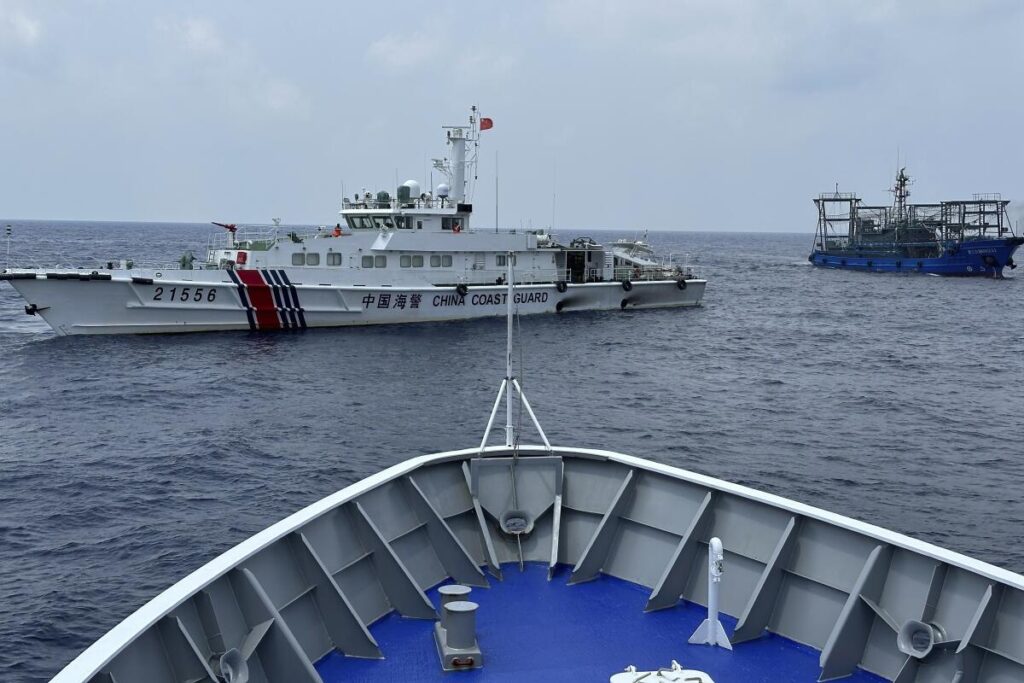
A Philippine navy patrol ship was shadowed by Chinese forces near a disputed shoal in the South China Sea, sparking a fresh exchange of accusations and warnings between the Asian neighbors Tuesday.
Chinese and Philippine security officials gave conflicting accounts of Monday’s encounter near Scarborough Shoal. China has surrounded the shoal with its navy and coast guard ships since a tense standoff with Philippine vessels more than a decade ago.
A rich fishing atoll and a safe mooring area during storms, Scarborough off the northwestern Philippines coast is one of most fiercely contested territories in the South China Sea, where Chinese and Philippine forces have faced off in recent months.
The frequent confrontations, which led to an Oct. 22 collision of Chinese and Philippine vessels near another disputed shoal, have prompted the United States to repeatedly renew a warning that it’s obligated to defend the Philippines, its oldest treaty ally in Asia, if Filipino forces, ships or aircraft come under an armed attack in the Pacific, including in the South China Sea.
Chinese air force Col. Tian Junli, a spokesperson for the Southern Theater Command of the People’s Liberation Army, said a Philippine warship trespassed into what he said were Chinese waters around Scarborough Shoal on Monday and was “tracked, monitored, warned and restricted” by the Chinese navy and air force for seriously violating “China’s sovereignty and international law.”
Philippine National Security Adviser Eduardo Año, however, said in Manila that the Philippine navy ship carried out a routine patrol of the waters in the vicinity of Scarborough “without any untoward incident,” but added that “Chinese vessels, as usual, conducted shadowing on the movement” of the Philippine navy ship.
Año accused China of hyping up the encounter and “creating unnecessary tensions between our two nations.”
“The Armed Forces of the Philippines and the Philippine coast guard will not be deterred by the aggressive and illegal activities” of China’s navy, coast guard and militia forces, he added. “We will protect our territory and sovereign rights at all cost,” Año said, citing the orders of Philippine President Ferdinand Marcos Jr. to Filipino forces.
The territorial disputes in the South China Sea, which also involve Vietnam, Malaysia, Taiwan and Brunei, have long been feared as an Asian flashpoint and have become a delicate fault line in the regional rivalry between the U.S. and China.
In Beijing on Tuesday, Singapore Defense Minister Ng Eng Hen underscored the importance of efforts to prevent conflicts from escalating, including by establishing defense hotlines.
Southeast Asian diplomats expressed concern over recent flare-ups of the disputes in the South China Sea in a new round of talks with their Chinese counterparts in Beijing last week, two regional diplomats told The Associated Press on condition of anonymity because they were not authorized to discuss the issue publicly.
During the talks on a proposed nonaggression pact, the Chinese and Philippine delegations had a “tense exchange” of renewed accusations over recent confrontations, one of the diplomats said.
The proposed pact aims to prevent occasional spats from degenerating into a major armed conflict, but the negotiations have been stymied by differences, including whether the agreement should be legally binding and what areas of the strategic sea passage it should cover.




